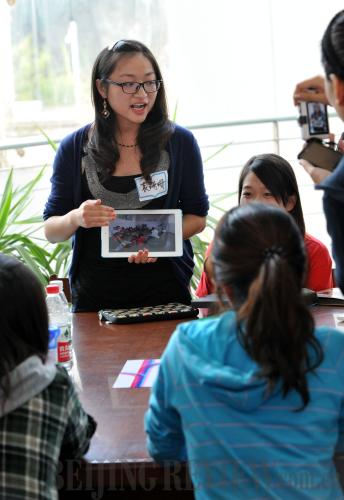|
 |
|
HUMAN BOOK: Yuan Shanhan shares her story of volunteering in Africa at a human library event at Nanjing Normal University on September 15, 2012 (SUN CAN) |
Click here for video
Ding Baoming thought her invitation to the Istarsea Library was to give a lecture. A novel idea, she thought. But when she arrived at the library in a university zone in west Beijing's Haidian District on December 8, 2012, there were no novels to be found, nor any other books.
"The owner told me it is a 'human library' where people share their stories instead of reading books," said Ding during her "reading."
Ding, born in 1962, suffers from polio and has been confined to a wheelchair since she was a year old. A self-taught tailor, she opened her own shop more than 20 years ago. Now she is president of the Beijing Boshi Clothing Co. Ltd. Last July, she went on a road trip with several other disabled people to see the Olympics in London.
More than 20 people, mostly young, were waiting for Ding at the library. The 120-square-meter library is actually a regular apartment. Ding told her story as "readers" sat or stood wherever they felt comfortable.
Ding showed a video of her road trip to London and then told her business story. Participants were free to interrupt at any point to exchange ideas on the topics she discussed—the Olympics, traveling in Europe and tailoring. A woman with a disabled leg showed Ding decorations she made with crutches and they discussed the nuances of tailoring clothing for the disabled.
"It is a very relaxing and fun experience in the library," Ding said in the end. "I want to participate in more events like this and encourage my friends to visit the library as well."
Human books
"I believe everyone has his or her own stories to share," said 29-year-old Li Xingning, founder and owner of the Istarsea Library.
Three years ago, Li announced her program of establishing a club for people to meet up and share stories on Douban.com, a Chinese social networking website. Soon after its publication, several people volunteered to join in it.
In the first two years, the club didn't have a fixed meeting place. Their humble book salon convened in various locales and gradually evolved into a kind of oral tradition.
"It wasn't until last year when a journalist told us what we were doing is quite like that of a human library," Li said.
Human libraries originated in Denmark in 2000, aiming to reduce prejudices and promote tolerance and understanding via dialogue. The "books" of a human library are living people who volunteer to share their stories with "readers." The idea has since spread to more than 45 countries around the world.
Li then decided to establish the first human library in Beijing. "My idea of being a 'librarian' is not just to arrange books on the shelves, but also to organize readers to sit together and talk," she said.
To accomplish this, Li took a year off from her job as an architect and spent time locating and decorating her dream library. "The ladder I used to paint the wall is still in the library, now as a decoration," Li said.
The library opened on December 25, 2011 with six "human books."
One of the first "human books" of the Istarsea Library is Yu Shi, a 25-year-old man who quit his job as a technician in an IT company in Beijing and traveled from southwest China's Yunnan Province all the way to Beijing. Yu made a living selling handmade postcards and singing on the street.
"I share my story to encourage more people to go for their dreams," Yu said. "I want to tell them once they go out of their comfort zone, they can find the beauty of life that they've never imagined before."
In recent years, human libraries have sprung up across China.
Han Lian, a graduate from Nanjing Normal University (NJNU) in east China's Jiangsu Province, knew the idea of human library when she was an exchange student in Hong Kong in 2005.
| 